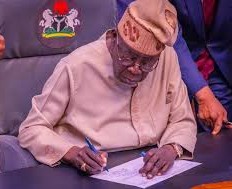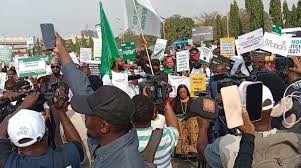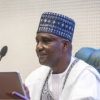The Federal High Court in Abuja has postponed the substantive hearing of the six-count cybercrime indictment filed by the Federal Government against the suspended Senator representing Kogi Central, Natasha Akpoti-Uduaghan, to October 20. The adjournment was a result of a preliminary objection presented by her counsel, Ehiogie West-Idahosa, SAN, who questioned the court’s jurisdiction to
The Federal High Court in Abuja has postponed the substantive hearing of the six-count cybercrime indictment filed by the Federal Government against the suspended Senator representing Kogi Central, Natasha Akpoti-Uduaghan, to October 20.
The adjournment was a result of a preliminary objection presented by her counsel, Ehiogie West-Idahosa, SAN, who questioned the court’s jurisdiction to address the matter.
Senator Natasha Akpoti-Uduaghan, who appeared in court on June 30 and was released on bail based on self-recognition, is currently facing charges related to the transmission of false and harmful information through electronic means, in violation of Section 24(2)(c) of the Cybercrimes (Prohibition, Prevention, etc.) (Amendment) Act, 2024.
The charges arise from statements she reportedly made in April, in which she accused Senate President Godswill Akpabio and former Kogi State Governor Yahaya Bello of conspiring to assassinate her.
The charges brought by the Director of Public Prosecutions of the Federation, Mohammed Abubakar, pertain to statements allegedly made by the individual during an event in Ihima, Kogi State, on April 4, 2025, which were subsequently reiterated in a television interview.
In one of the counts, the prosecution quoted her as saying,“…and Akpabio told Yahaya Bello, I am saying, standing by what I have said. He told him that he should make sure that killing me does not happen in Abuja, it should be done here, so it will seem as if it is the people that killed me here…”
The FG, represented by David Kaswe, told the court that the government was fully prepared to proceed.
“My Lord, the business of the day is for the prosecution to open its case. Our first witness is present and ready to testify. We have also mounted a television screen to play video evidence,” he said.
Senator Akpoti-Uduaghan’s legal team, headed by Mr. Ehiogie West-Idahosa, SAN, notified the court of a preliminary objection filed by their client, contesting the court’s jurisdiction to hear the case.
“My Lord, we have filed a notice of preliminary objection challenging the jurisdiction of this court. Our contention is not about the nature of the charge but about what we see as an abuse of the prosecutorial powers of the Attorney-General of the Federation. In addition, we have not been served with the statements of the prosecution’s witnesses, which violates our client’s right to a fair hearing,” he argued.
Kaswe pushed back, accusing the defence of attempting to delay the case. He said, “The defence is only employing delay tactics. Their objection is not substantial enough to stop the court from hearing the substantive matter today,” he said.
In his ruling, Justice Mohammed Umar underscored the critical importance of jurisdiction. He stated, “Jurisdiction is a fundamental issue that must be resolved prior to addressing the merits of the case. Accordingly, I will consider the preliminary objection before allowing the prosecution to proceed.” The matter was then adjourned to October 20.
Legal and Political Significance
This case is among the first high-profile tests of the 2024 amendment to the Cybercrimes Act, which expanded the scope of punishable online speech and stiffened penalties. Human rights lawyers have warned that its broad provisions could be weaponised against politicians, activists, and journalists.
If the court upholds the preliminary objection, the case may collapse at the threshold, striking a blow to the government’s prosecution strategy. But if the objection fails, the trial could set a precedent for the interpretation of the new cybercrime provisions, particularly on issues of free speech, political criticism, and the limits of parliamentary privilege.
However, with the adjournment, the October 20 hearing is expected to be crucial. The court will decide whether it has the jurisdiction to try the case. Only after that ruling will the prosecution be allowed to call its witnesses and play its evidence.



















